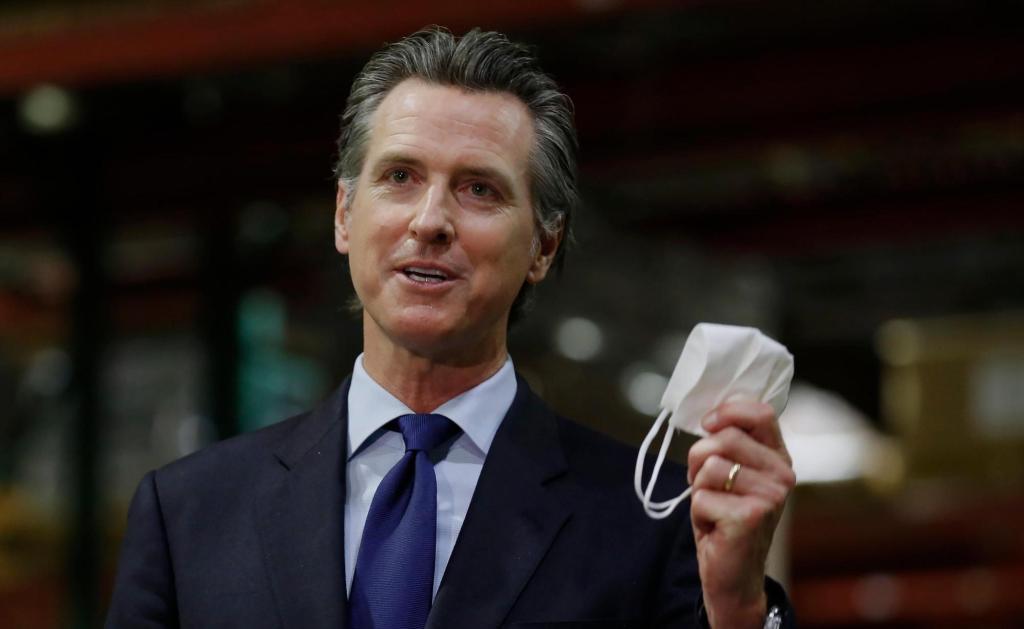California’s workplace-safety board on Wednesday voted to drop controversial new rules that could have required many workers to keep their masks on for months, yielding to growing pressure — just hours after state officials announced that vaccinated Californians can go mask free in most settings starting next week.
A new proposal will be developed by Cal/OSHA staff, to align in a yet-to-be-determined manner with CDC guidelines, board chair David Thomas said. The board will take up that proposal in a meeting next week; Thomas said a new rule would take effect around June 28.
The Cal/OSHA workplace standards board had previously issued new rules, effective June 15, saying workers vaccinated against COVID-19 must still wear masks if anyone in the same room is unvaccinated. That would have conflicted with the state’s plans for reopening the same day in accordance with guidance from the U.S. Centers for Disease Control allowing fully vaccinated people to resume most indoor and outdoor activities without masks, even around unvaccinated people.
The decision followed last week’s approval of the now-withdrawn rules in a nine-hour meeting that featured fractious commentary from the public, including what Thomas described as disturbing language in the chat stream. After the unanimous vote Wednesday night, which followed public comments laced with vaccine conspiracy theories, mask misinformation and threats of lawsuits over perceived government overreach, Thomas became emotional describing the board’s role as public servants receiving negligible pay while struggling to keep Californians safe amid widespread anger at public officials.
“None of us really like this,” he said of the rancorous and polarizing climate in which the board is making rules. “I’d rather be alive, get vaccinated and wear a mask, than not be. Everybody’s trying to protect themselves and their family.”
Withdrawal of the new rules means at least a temporary return to Cal/OSHA’s original November 2020 rules, the board’s executive officer Christina Shupe said. Those rules require all workers to be masked, regardless of vaccination status, unless they’re alone in a room. It was not immediately clear whether workplaces would operate under their own separate rules after the state reopens June 15 and before a new Cal/OSHA rule comes into effect around June 28.
The new workplace rules had drawn strong opposition from business groups. Gov. Gavin Newsom, who said the state would begin following CDC guidance Tuesday, had repeatedly urged the board to revise them.
Earlier in the day, state Health and Human Services Secretary Dr. Mark Ghaly had announced the news that fully vaccinated Californians will not need to wear masks in public, according to the new guidance, except on public transportation, indoors at schools and similar youth situations, and at health-care settings — including care facilities, homeless shelters and cooling facilities.
Ghaly said that “the message is updating our guidance … to align with the CDC and provide high-risk settings or certain settings in which they’ll be recommended.”
Unvaccinated individuals, however, must continue to wear masks in indoor public settings and businesses, such as retail stores, theaters, restaurants and other state and local government offices serving the public.
As for workers, Ghaly was clear: Even though the state’s overall guidance will align with the CDC, the “overriding or primary guidance” for workplaces will continue to be whatever standards Cal/OSHA finalizes.
“Workplaces and employers are subject to the Cal/OSHA standards,” Ghaly said. “That does not change.”
While much of the first three hours of the Cal/OSHA meeting Wednesday evening was given to presentations by state officials and public comment, board members had preliminary discussions of their rule making, showing divisions over whether employees should be able to self attest to their vaccination status. Board member Barbara Burgel said she liked the idea of giving employers the ability to choose how to handle vaccination status among workers. “Self-attestation is used in a lot of different circumstances, and I’m not too concerned about it,” Burgel said.
During public comment, employer representatives uniformly called for the board to scrap the new rules and align with the CDC, while worker advocates pointed to ongoing workplace outbreaks and called for the board to keep the new rules, arguing that masks were still vital for containing the virus. Business representatives raised worries of mask rules setting vaccinated and unvaccinated workers against each other and workers against employers.
OSHA’s decision last week drew strong opposition from a dozen business groups, including the California Business Roundtable, California Retailers Association and the California Restaurant Association, who demanded in a letter to Newsom on Monday that he overturn the OSHA rules and allow vaccinated employees to go mask-less without regard to unvaccinated co-workers.
Kevin Bland, a lawyer representing business groups, said Wednesday that imposing mask rules would create friction among workers, who would blame their employers. “Now we’re making the employer be the bad guy instead of the state of California being the bad guy, and that’s a difficult position to be in,” Bland said.
Although the order upset employers concerned about policing workers’ vaccination status and drew ire from employees tired of masks, other workers who expressed concern for their safety applauded the rules or said they don’t go far enough.
Inconsistencies and conflicts around mask rules reflect the high-stakes uncertainties around returning to normal life as the deadly pandemic wanes, said Suzanne Teran, associate director of the Labor Occupational Health Program at UC Berkeley.
“Where we’re at right now is trying to assess what can we do, what is safe, what is not safe, how do we continue to protect workers who go back to the workplace?” Teran said. She pointed out that COVID-19 variants are circulating, and it remains unclear how long vaccines will be effective before boosters may be necessary. “We know that California right now has a low case rate, but we’ve also had all these protections in place. Are we really ready to say we’re all done?”
Some workers can’t get vaccinated because of health issues, while others have not yet had the shots, Teran noted. Without a mask requirement, those workers could be at risk if unvaccinated co-workers aren’t honest about their status and go unmasked, Teran said. And, she said, “There is a contingent of employers who don’t necessarily follow established labor law anyway — are they going to follow these requirements?”
Regulators are still trying to determine how employers might verify vaccine status. Bay Area employment lawyer Sandy Rappaport told this news organization earlier that employers can require vaccination as well as proof of vaccination, but privacy issues could arise if unvaccinated people are required to wear masks, indicating their status.
Ghaly acknowledged on Wednesday that “all verification systems are fraught with some challenges” and emphasized that businesses can decide for themselves how they want to enforce mask wearing. No Californian, however, may be turned away from patronizing a business or activity for wearing a mask.
Santa Clara County already requires employers to document the vaccine status of all on-site workers. Employees are not required to share their vaccine status, but if they refuse, the employer must treat them as unvaccinated.
The Cal/OSHA board is expected to consider new proposed rules June 17.










